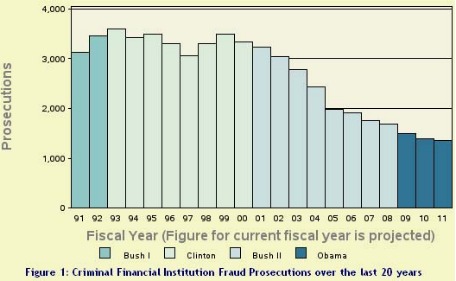The Wall Street Journal would have you believe Wall Street is running scared from all the financial cops in New York (emphasis mine):
For decades, New York has served as home to ambitious prosecutors and regulators eager to make waves that ripple well beyond its boroughs.
But the race to investigate, indict, subpoena and fine has reached a new level of intensity this year, as the creation of a new state financial-services watchdog—led by former federal prosecutor Benjamin M. Lawsky—has added another powerful player to an already crowded field…
The budding rivalries and partnerships between these lawmen are making corporations, along with New York’s local industry, Wall Street, nervous. Corporate and financial executives and their advocates fear an arms race of prosecution, driven by ambition and the public’s desire to blame the business community for the financial crisis.
Sorry, but I’m not buying it. Here’s one reason why:
That chart is only through last year, but who wants to bet 2012 will even reach mid-Bush Administration numbers?
— Alan Mutter has a must-read post on the grave threat to one of the newspaper industry’s few remaining cash cows: Preprint ads, which one industry source tells him account for 70 percent of Sunday paper revenues.
Unfortunately for publishers, preprints are threatened by two circumstances that are well beyond their control. They are:
∷ The digital revolution, which is (a) unraveling the business models of many of the big-box retailers who historically have been the biggest buyers of preprint advertising and (b) encouraging even healthy bricks-and-mortar retailers to shift from high-priced print advertising to targeted and inexpensive digital formats.
∷ A favorable rate cut granted last week by the U.S. Postal Service to Valassis Communications, which will enable the direct-marketing company to mail certain types of national retail preprints for 42% less than newspapers are required to pay for the same product. The NAA says the Valassis deal could divert no less than $1 billion in advertising revenues from newspapers to the direct-mail company, which generated more than $2 billion in sales in the last 12 months by mailing its Red Plum ad circulars to consumers.
— I’m sure working people are glad to see that the economists are finally catching up to what they’ve known for decades: Globalization and so-called free trade policies have wounded the middle class. Edward Alden in the NYT:
For decades, economists resisted the conclusion that trade – for all of its many benefits — has also played a significant role in job loss and the stagnation of middle-class incomes in the United States. As recently as 2008, for instance, Robert Lawrence of Harvard, one of the country’s most respected trade experts, concluded that trade explained only a small share of growing income inequality and labor market displacement in the United States.
Rather than focusing on trade, economists argued that other factors – especially “skill-biased technical change,” technological innovation that puts an added premium on skilled workers – played the biggest role in holding down middle-class wages. But now economists are beginning to change their minds. Responding to The Times’s recent survey about the causes of income stagnation, many top economists have cited globalization as a leading cause…
The real-world evidence makes it surprising that it has taken economists so long to catch on. The recent strike in Joliet, Ill., at Caterpillar – a true global company — ended with union workers being forced to accept an agreement that includes a six-year wage freeze, even as the company is earning record profits. Elsewhere, two-tier agreements, in which new hires earn wages and benefits roughly half as large as those in the old union contracts, have become standard in many of the manufacturing industries that remain in the United States.
The economists, despite their error and its impact on the middle class, will presumably be fine.
Ryan Chittum is a former Wall Street Journal reporter, and deputy editor of The Audit, CJR’s business section. If you see notable business journalism, give him a heads-up at rc2538@columbia.edu. Follow him on Twitter at @ryanchittum.

